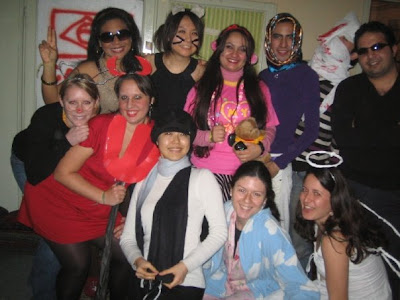Sunday, February 24, 2008
Adventures in the Bazaar
Thursday, February 21, 2008
The Kurdish problem
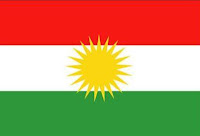 Before arriving in Turkey, I was more or less aware of the conflict pertaining to the Kurdish minority group encircling national politics, national unity and national security. However, I was largely unaware of the complexity and severity of this problem until I began hearing racist remarks and witnessing repeated terrorist attacks in eastern Turkey on the nightly news.
Before arriving in Turkey, I was more or less aware of the conflict pertaining to the Kurdish minority group encircling national politics, national unity and national security. However, I was largely unaware of the complexity and severity of this problem until I began hearing racist remarks and witnessing repeated terrorist attacks in eastern Turkey on the nightly news.The Kurdish population, belonging to a distinct ethnic and linguistic group, stands at about 20-25 million. It is concentrated in parts of eastern Turkey, Syria, Iran and Iraq, making up a region known as Kurdistan. Twenty percent of Turkey's population is Kurdish, though Turkey's constitution provides a single nationality designation for all Turks and therefore does not recognize Kurdish citizens as national, racial or ethnic minorities. The Kurdish national movement dates back to 1925, and there has been an active Kurdish separatist movement in southeastern Turkey since 1984.
The government's main strategy for assimilation is through language suppression, forcibly banning speaking or writing Kurdish (remember my previous post, Turks are very nationalist!). Kurdish resistance to this "Turkification" includes both nonviolent struggle, peacefully working through the political system, and violent armed struggle. The best known and most radical of these armed movements is the PKK (Kurdistan Worker's Party), which does not represent the majority of Kurds. The PKK was formed in the late 1970s by Abdullah Öcalan, with the declared objective of setting up an independent Marist Kurdish state in the area comprising Kurdistan. It is estimated that more than 37,000 people have been killed in the Turkey-PKK conflict since 1984.
However, to view the Kurdish problem as simply the fighting and terrorism of the PKK in the southeastern provinces is both misguided and demonstrates an incomplete understanding of the wide reach and depth of this struggle. This conflict affects every Turkish citizen. In Turkey, compulsory military service applies to all male citizens from 20-41 years of age. My dear friend Tansu will be joining the military shortly after I leave Turkey, as will nearly all of the young men I have met during my time here. Additionally, the grievances of the millions of Kurds whom do not support the PKK but are victim to ongoing fighting, is an international problem. Kurds who publicly or politically assert their identity risk public censure or harassment. Lastly, this conflict affects me. I live in a neighbourhood known to occupy many Kurds and I have met many people who are proud to be Kurdish, sharing with me their traditional music and food. I believe that it is time for the government to move toward a solution of the Kurdish problem, not through the use of violence, but through bold new policy which recognizes the Kurdish minority and encourages economic growth in areas comprising Kurdistan.
Minor Bruising
I would like to warn any traveller coming to Turkey to beware of the narrow, spiralling staircases. Any misstep and you could end up like this...
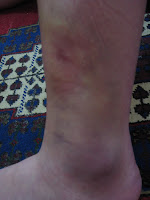
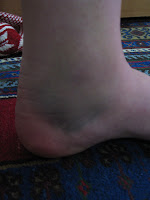
I am OK. I can walk and nothing is broken. I went to a pharmacy and bought a special cream which will help me heal faster. My host father recommends pressing olives and then applying to the skin, I will try that too. To be honest, I don't feel any pain at all, so I can't quite understand why my left leg looks like an abstract painting gone terribly wrong..
Monday, February 18, 2008
Family Life
Yesterday, a Turkish student asked me what I miss most about the US. I answered, "toilets and peanut butter." Of course, the real answer is my family!
Living with a family has proven to be an accelerated course on Turkish culture. Family is the strongest social institution in Turkey, and therefore forms a framework to impose social controls and acceptable patterns of public behavior. Traditionally, extended families live together. The floors above me are all occupied by aunts and uncles belonging to the father's family. Unmarried daughters live with their family, and after marriage they become a member of the husband's family unit.
Tradition places the father as the head of the family. My father is self-employed and works with his brothers in the textile industry. He works Monday-Saturday, leaving early in the morning and returning home late at night. He is quiet and reserved, but very loving. My mother is a homemaker and an excellent cook. She is currently taking care of her ill father in Konya and we all seem lost without her. A Turkish proverb says "a husband should know how to bring food and the wife to make it suffice," the truth in this proverb is that most men do not know how to cook if their life depended on it! Masculine and feminine roles are clearly defined in traditional Turkish society; however I have witnessed conflict between traditional and modern values among youth which may suggest that gender roles are slowly changing to encompass more public space for both sexes.
It is very difficult to be a Turkish youth. Young women in particular suffer from constrained socioeconomic mobility. Most unmarried daughters do not tell their fathers about boyfriends, and when we go on a weekend trip, many of the girls have to lie to their family in order to get permission. I find boyfriends in Turkey to be irritatingly jealous and controlling, even the smallest interactions with other men can cause conflict in a relationship. I can also say that Turkish relationships are very warm, and I love the way boyfriends and girlfriends will pinch each other's cheeks to show affection.
Confucius said, "by nature (people) are pretty much alike. It is their learning and practices that distinguish them." I think topics relating to culture must be approached with brevity and sensitivity. My next two topics will be women in Islam and the Kurdish problem, the two most frequent topics I have contemplated since arriving in Turkey, both are equally absorbing!
Living with a family has proven to be an accelerated course on Turkish culture. Family is the strongest social institution in Turkey, and therefore forms a framework to impose social controls and acceptable patterns of public behavior. Traditionally, extended families live together. The floors above me are all occupied by aunts and uncles belonging to the father's family. Unmarried daughters live with their family, and after marriage they become a member of the husband's family unit.
Tradition places the father as the head of the family. My father is self-employed and works with his brothers in the textile industry. He works Monday-Saturday, leaving early in the morning and returning home late at night. He is quiet and reserved, but very loving. My mother is a homemaker and an excellent cook. She is currently taking care of her ill father in Konya and we all seem lost without her. A Turkish proverb says "a husband should know how to bring food and the wife to make it suffice," the truth in this proverb is that most men do not know how to cook if their life depended on it! Masculine and feminine roles are clearly defined in traditional Turkish society; however I have witnessed conflict between traditional and modern values among youth which may suggest that gender roles are slowly changing to encompass more public space for both sexes.
It is very difficult to be a Turkish youth. Young women in particular suffer from constrained socioeconomic mobility. Most unmarried daughters do not tell their fathers about boyfriends, and when we go on a weekend trip, many of the girls have to lie to their family in order to get permission. I find boyfriends in Turkey to be irritatingly jealous and controlling, even the smallest interactions with other men can cause conflict in a relationship. I can also say that Turkish relationships are very warm, and I love the way boyfriends and girlfriends will pinch each other's cheeks to show affection.
Confucius said, "by nature (people) are pretty much alike. It is their learning and practices that distinguish them." I think topics relating to culture must be approached with brevity and sensitivity. My next two topics will be women in Islam and the Kurdish problem, the two most frequent topics I have contemplated since arriving in Turkey, both are equally absorbing!
Saturday, February 16, 2008
My Perfect Day
I woke up this morning to a coffee-colored sky and the silence of snow. Big, fluffy snow falling slowly and gently. The kind of snow which appears on Hallmark cards and Campbell soup commercials. I woke up this morning among good company: Victor from Mexico, Frank from China and Tansu from Turkey. We devoted our morning to salubrious laziness. Remaining in our pajamas, we watched movies and made eachother laugh, with the occassional big-bellied guffaw that can only be exchanged between close friends. Venturing outdoors well past noon, encouraged by our growling stomachs, I suddenly realized why I love so much to travel--those things which may seem ordinary and familiar, such as snow and busy streets, have the power to transform into something new and mysterious once viewed in a different landscape: This morning I saw snow for the first time. It fell in soft, cottony chunks and collected upon buildings and the people like a temporary shadow.
As I now write to you, the sky has cleared and a darkness begins to envelop the city. I can hear music billowing from a scratchy radio across the street where a large crowd is gathered for a Kurdish wedding party. My perfect day has left me feeling nostalgic; though this may seem insensible to those who are reading this blog, I am currently yearning for the days of Chutes & Ladders and Candyland, drinking milk straight from the carton, the sound and smell of a Texas rainstorm, and those quips and quotes we accidentally stumble upon which make us feel invincible and inevitably changed.
"The greatest glory of living lies not in never falling, but in rising everytime you fall."
-Nelson Mandella
As I now write to you, the sky has cleared and a darkness begins to envelop the city. I can hear music billowing from a scratchy radio across the street where a large crowd is gathered for a Kurdish wedding party. My perfect day has left me feeling nostalgic; though this may seem insensible to those who are reading this blog, I am currently yearning for the days of Chutes & Ladders and Candyland, drinking milk straight from the carton, the sound and smell of a Texas rainstorm, and those quips and quotes we accidentally stumble upon which make us feel invincible and inevitably changed.
"The greatest glory of living lies not in never falling, but in rising everytime you fall."
-Nelson Mandella
Friday, February 15, 2008
Work Update
I know that everybody is curious about my lack of work! Here is a long overdue update for those who have been worried about me:
1. This weekend I am facilitating a conference for new AIESEC members in Bursa on intern reception. The main focus of this training will be on conflict management and problem-solving techniques. I am the perfect person for the job after my experience with AIESEC Bursa!
2. I am creating a reception booklet for trainees coming to Bursa which will contain practical advice, information on Turkey and Bursa, and some suggestions for travelling around the country and things to do in Bursa.
3. I will be participating in the Meet My Friend project, which requires me to visit different highschools and make presentations on American culture to Turkish students.
1. This weekend I am facilitating a conference for new AIESEC members in Bursa on intern reception. The main focus of this training will be on conflict management and problem-solving techniques. I am the perfect person for the job after my experience with AIESEC Bursa!
2. I am creating a reception booklet for trainees coming to Bursa which will contain practical advice, information on Turkey and Bursa, and some suggestions for travelling around the country and things to do in Bursa.
3. I will be participating in the Meet My Friend project, which requires me to visit different highschools and make presentations on American culture to Turkish students.
Wednesday, February 13, 2008
Carnival
Monday, February 11, 2008
Underground Cistern in Istanbul
Last weekend I went to Istanbul, the only city in the world that sits on two continents! These pictures are from Yerebatan Sarayı, "sunken palace", which is a Byzantine cistern built in the 6th century. The arched roof is supported by 336 columns! You can also find two giant carved Medusa heads supporting two of the columns.
Nationalism
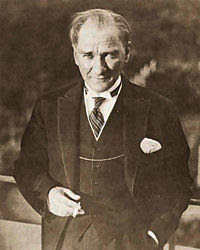 The most visible form of nationalism in Turkey, aside from the Turkish flag, is Mustafa Kemal Atatürk. He is the founder of the Republic of Turkey as well as its first President. I see this guy everywhere! A brief biography from www.ataturk.com/:
The most visible form of nationalism in Turkey, aside from the Turkish flag, is Mustafa Kemal Atatürk. He is the founder of the Republic of Turkey as well as its first President. I see this guy everywhere! A brief biography from www.ataturk.com/:Emerging as a military hero at the Dardanelles in 1915, he became the charismatic leader of the Turkish national liberation struggle in 1919. He blazed across the world scene in the early 1920s as a triumphant commander who crushed the invaders of his country. Following a series of impressive victories against all odds, he led his nation to full independence. He put an end to the antiquated Ottoman dynasty whose tale had lasted more than six centuries - and created the Republic of Turkey in 1923, establishing a new government truly representative of the nation's will.
As President for 15 years, until his death in 1938, Mustafa Kemal Atatürk introduced a broad range of swift and sweeping reforms - in the political, social, legal, economic, and cultural spheres - virtually unparalleled in any other country.
His achievements in Turkey are an enduring monument to Atatürk. Emerging nations admire him as a pioneer of national liberation. The world honors his memory as a foremost peacemaker who upheld the principles of humanism and the vision of a united humanity. Tributes have been offered to him through the decades by such world statesmen as Lloyd George, Churchill, Roosevelt, Nehru, de Gaulle, Adenauer, Bourguiba, Nasser, Kennedy, and countless others. A White House statement, issued on the occasion of "The Atatürk Centennial" in 1981, pays homage to him as "a great leader in times of war and peace". It is fitting that there should be high praise for Atatürk, an extraordinary leader of modern times, who said in 1933: "I look to the world with an open heart full of pure feelings and friendship".
Saturday, February 2, 2008
A Moveable Feast
If you are lucky enough to have lived in Paris as a young man, then wherever you go for the rest of your life, it stays with you, for Paris is a moveable feast.
-Ernest Hemingway
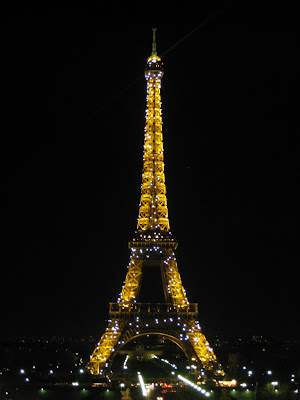
Paris was wonderful but it made me realize how much I miss all of the people in this world that I love so much! I am lucky to have so many special people in my life and cannot wait to see everyone again in March. Pictures from Paris are now on smugmug:
http://mullett.smugmug.com/Travel
-Ernest Hemingway
Paris was wonderful but it made me realize how much I miss all of the people in this world that I love so much! I am lucky to have so many special people in my life and cannot wait to see everyone again in March. Pictures from Paris are now on smugmug:
http://mullett.smugmug.com/Travel
Subscribe to:
Posts (Atom)

